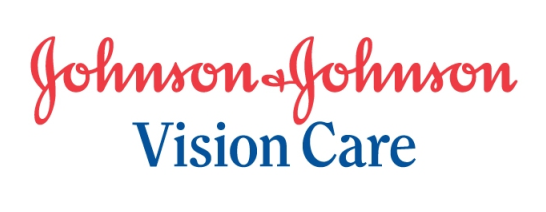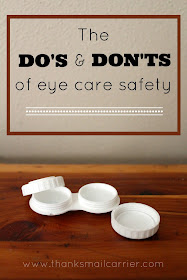I wrote this review while participating in an Influencer campaign by Mom Central Consulting on behalf of Johnson & Johnson Vision Care, Inc. and received a promotional item from Mom Central to thank me for participating.
Although I received my first pair of prescription eyeglasses when I was in sixth grade, it wasn't until my college years that I decided to try out contact lenses. Up until that point, my squeamishness about having to touch my own eyeballs was too strong so I made do with my glasses (and squinting during the times that I didn't have them on).
But then suddenly, I was glasses-free. And, although I'd like to say that I took perfect care of my contacts and diligently followed the instructions my eye care professional gave... we all know that isn't true. I was in college, after all, so of course there were nights that I slept in my contacts, times that I put them in without having the cleanest of hands, and more.
However, in the decades since I made that leap to contacts, I have learned much more about the importance of practicing safe contact lens wear and care and now do a much better job of taking care of my eyes. Therefore, with Halloween right around the corner and an increase in the number of adults and teens that might be reaching for decorative contact lenses, now is the perfect time to talk about safe eye care practices.
While these images may be appealing to some (I'm not one of them, these make me shudder), the practice of purchasing cosmetic contact lenses without a prescription is no laughing matter. By definition, a contact lens is a medical device and in the United States, all contact lenses, even purely cosmetic ones, require a prescription. We're talking about the health of your eyes here!
Actually, Halloween isn't the only time of year that people try contact lenses without a prescription. According to the American Optometric Association’s 2013 American Eye-Q consumer survey, 17% of Americans have worn decorative contact lenses that don't provide vision correction as part of a costume or for other cosmetic purposes. Of those individuals, 24% purchased them without a prescription from a source other than an eye doctor.
This fall, Johnson & Johnson Vision Care, Inc., manufacturer of ACUVUE Brand Contact Lenses, aims to remind us how important it is to practice safe contact lens wear and care. It is extremely important to talk to your eye care professional about adopting best contact lens practices, but, in the meantime, here are some do's and don'ts of eye care safety to help make sure that you are wearing and caring for your contact lenses safely and effectively.
DO
- Wash and rinse your hands thoroughly with a mild soap and dry with a lint-free towel before handling your lenses.
- Put in your contacts before you put on your makeup or any costume paint.
- Remove lenses immediately if you experience eye discomfort, excessive tearing, vision changes or redness of the eye or other problems and promptly contact your eye care professional.
- Always remove, clean and disinfect your lenses according to the schedule recommended by your eye doctor.
DON'T
- Wear another person's lenses.
- Wear lenses longer than the time frame recommended by your eye doctor.
- Rinse your lenses in water from the tap or expose them to any water — such as swimming or showering — while wearing them.
- Use anything aside from recommended solution by your eye doctor, such as saliva, to lubricate your lenses.
I have to admit that the one area in which I find myself bending the rules is exposing my contacts to water. While I always clean and rinse them in the correct solution, I do put them in before I go swimming — how else would I be able to see while in the water (without having to worry about my glasses coming off or constantly wiping the water off of them)?
This season and beyond, take care of your eyes! Only obtain contact lenses via a prescription from a licensed eye care professional — although many retails store sell cosmetic contacts, contacts purchased over the counter without proper fitting and oversight by an eye doctor can cause serious risk and/or permanent damage to the health of your eyes.
At the same time, regular contact lens wearers should always practice good hygiene habits when inserting/removing contact lenses, take proper lens care and follow wearing and replacement schedules.
You can even keep track of your individual contact lens replacement schedule with the ACUMINDER Tool, a free service that sends an automatic reminder via email and/or cell phone text message on when to replace contact lenses, when to order new lenses and when to schedule an eye exam. Registration is free and open to all contact lens wearers!
You can also find great information on contact lenses, solutions, cases and more by visiting Healthy Vision & Contact Lenses, a resource with additional tips and information from Johnson & Johnson Vision Care, Inc.
Do you wear contact lenses? How well do you take care of them and your eyes?






What a very important post! I got an eye ulcer one time because I left my contacts in too long. I do not wear contacts anymore because of dry eyes. But it is so important to make sure not to leave contacts in longer than you are supposed to.
ReplyDeleteWhen I first wanted contacts I was told my eyes were not good candidates for them. Fast forward 30 years and now I just don't want them.
ReplyDeleteslehan at juno dot com